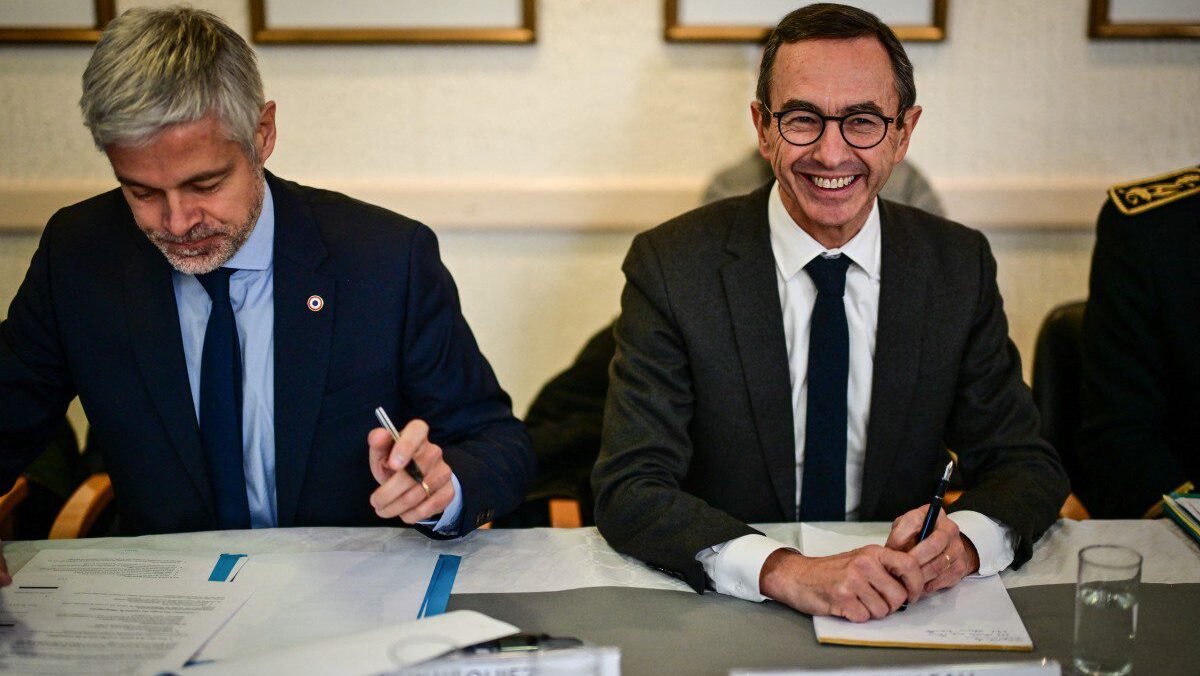
Bruno Retailleau (R) and Laurent Wauquiez (L) attend a meeting at the city hall of Monistrol-sur-Loire, on November 22, 2024.
Photo: OLIVIER CHASSIGNOLE / AFP
The battle of the chiefs—an old speciality of the French Right—is back. In the atmosphere of political decay gripping France, all eyes are already on the 2027 presidential election. The government Right, represented by Les Républicains (LR), is preparing and looking for its man of destiny. Two figures are facing off, two political lines, and two electoral strategies—a division that has ensured defeat for years.
On Monday, February 17th, the board of the party was due to meet to decide on the organisation of its next congress and the election of its new president. There are just over two years to go before the next French presidential election. But given the deadlock in French politics since the dissolution of the National Assembly in June 2024 and the lack of a political majority, ambitions are sharpening earlier than usual.
Two figures are vying for the presidency of the LR, with an eye on the presidential candidacy.
The first is Bruno Retailleau, the current minister of the interior and former leader of the LR senators. Known for his conservative views (he began his political career alongside the sovereigntist Philippe de Villiers), he agreed to join François Bayrou’s centrist government, where he tries to embody a right wing that is firm on security and immigration issues—so far without political success. He wants to take advantage of the popularity his public stances have given him to win back the party presidency, and some already see him as the potential saviour of the Right.
The second, his opponent, is Laurent Wauquiez, leader of the LR deputies and former president of the Rhône-Alpes-Auvergne region, the second largest region of France. On the announcement of Retailleau’s candidacy, he immediately accused his competitor of “bearing the heavy responsibility of starting a war of the chiefs.”
The ‘war of the chiefs’ within the main party of the right-wing government has a long tradition—almost uninterrupted in political life since the retirement and then death of General de Gaulle in 1970. France does not have a candidate selection system like the American primaries, and the confrontation between potential presidential candidates always turns sour. Since the election of socialist president François Hollande in 2012, the Right has struggled to gain support, with internal quarrels undermining a party unable to win an election at the national level.
In recent days, the media has been full of acerbic statements and unpleasant innuendo between the two men. Wauquiez is trying to discredit his rival by accusing him of neglecting his duties as minister of the interior: “It would be better if he could devote himself fully to his work at Beauvau [the headquarters of the ministry of interior],” the deputy’s entourage whispers. Wauquiez maintains that an agreement had been reached between them (“It’s up to you to embody the right in government, it’s up to me to rebuild our political family”) and that Retailleau is in the process of trampling on this pact. The interior minister denies this and wants to capitalise on his popularity. “Today, I want to do for my party what I do as head of my ministry: speak truthfully and act quickly,” he said.
Behind the rift between the two men lie other issues: what strategy and political direction for a French Right exhausted and ousted from power for more than a decade? Both men claim to embody a strong right wing that is proud of its values, ‘that stands up for itself.’ But one, Retailleau, is stuck in a centrist government. And the other, Wauquiez, in the National Assembly, regularly votes with the centre, even with the Left—in a strategy very similar to that of the EPP at the European level. How can we believe them?
The latest debates on the right to citizenship on the island of Mayotte proved it. When the Rassemblement National (RN) proposed going further with the reform by introducing an amendment to abolish birthright citizenship throughout French territory, the LR deputies did not vote for it, on the hackneyed grounds that they did not want to support the RN’s policy. Wauquiez claims to be “very free” and “very independent”—in his own words—but for the moment, his camp does not know how to do anything other than align with the presidential camp. Retailleau gives the impression of being more sincere in his approach but remains stubbornly silent on his future strategy toward the RN.
However, beyond the cockfight, what will interest right-wing voters as the presidential election approaches will be the ability of the LR candidate to get along with those who today embody right-wing politics in France: the RN and its allies, the UDR (Union des Droites pour la République, or Union of the Rights for the Republic)—made up of LR members who left the party—and Marion Maréchal’s party, Identité-Libertés.
The question facing the French Right as a whole is always the same: how to reach the second round of the presidential election, and once this stage has been achieved, how to cross the 50% mark and come to power? The division of the LR party has the effect of making things easier for the RN. It remains to be seen what the decision will be of those who have stubbornly followed the path proposed by Wauquiez and Retailleau. These two men are just two sides of the same coin. Will they allow, once again, the victory of soft centrism, or will they dare, at last, in the words of Wauquiez, to make “the break” with the system—always promised, never achieved?
